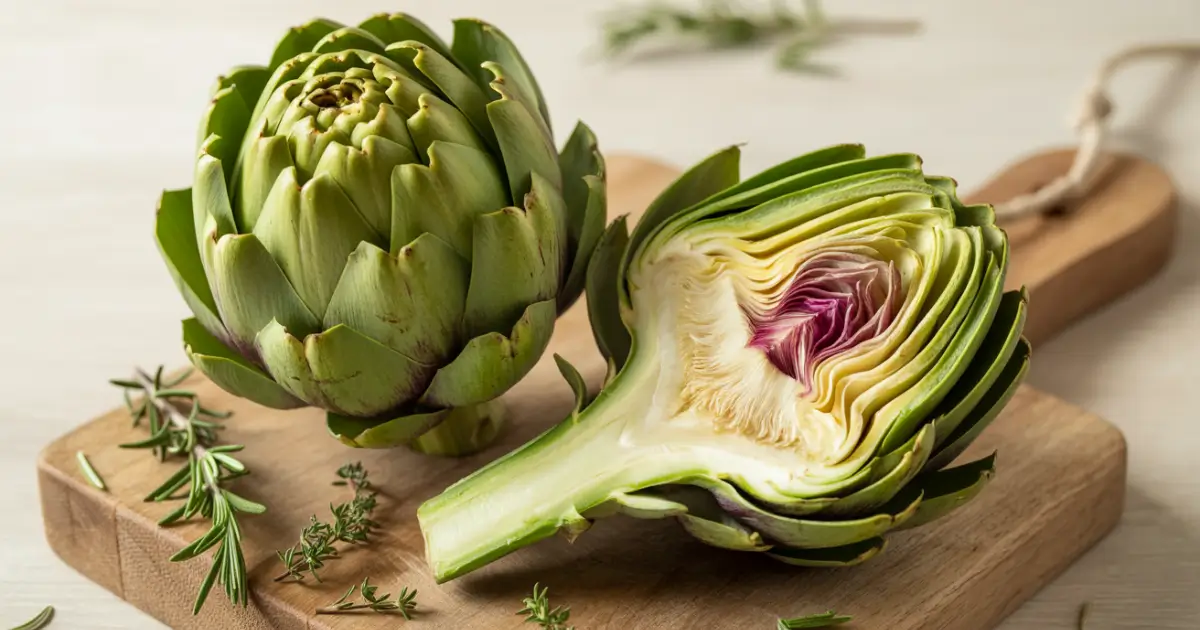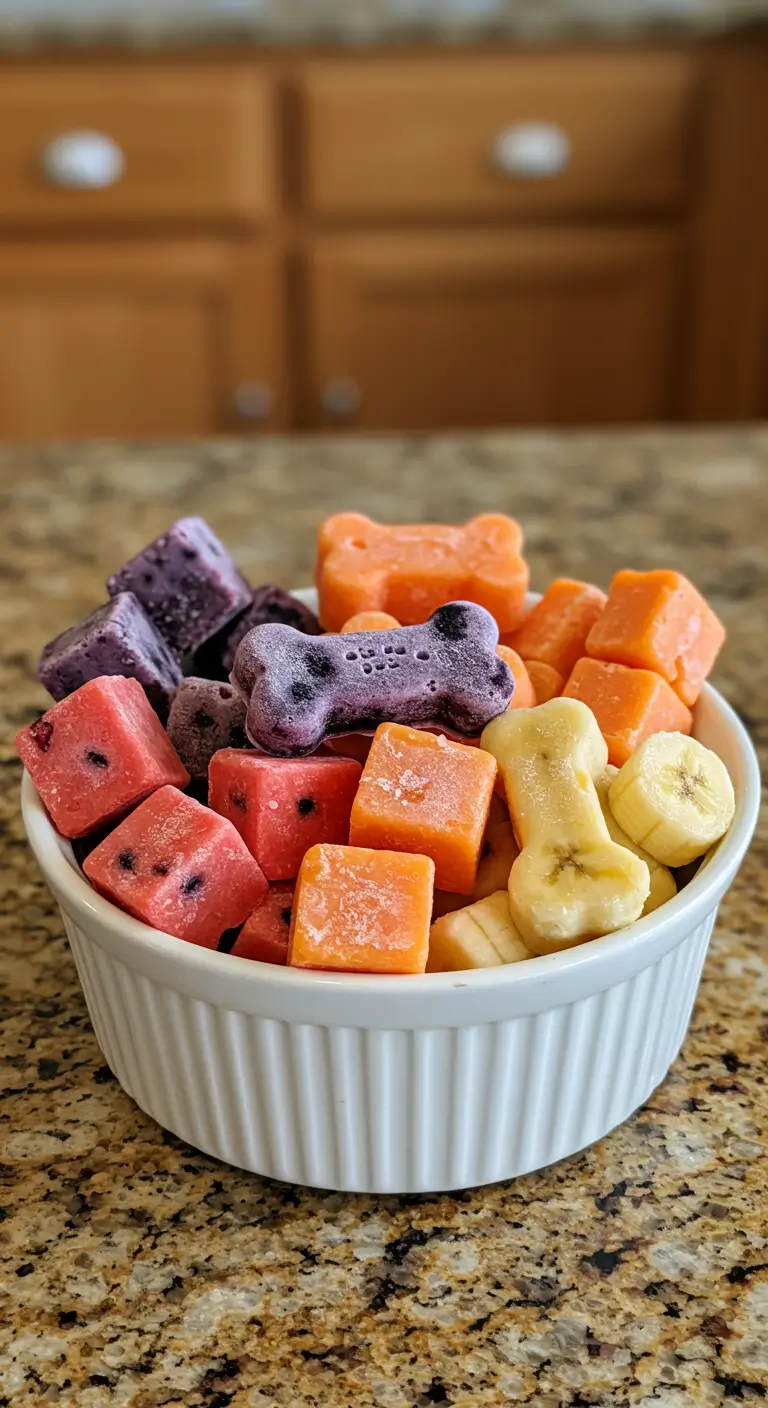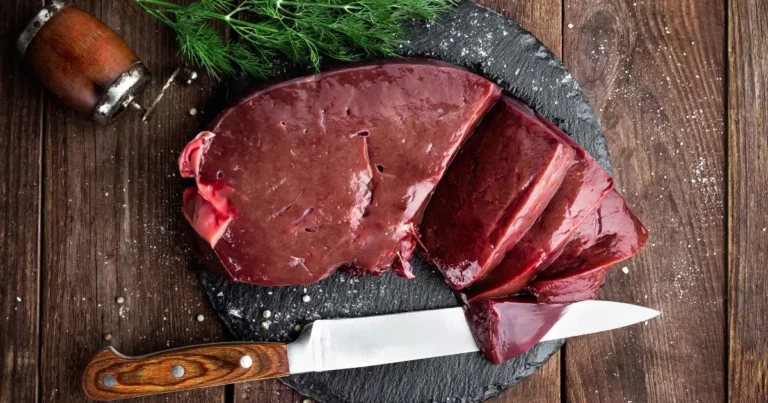Can Dogs Eat Artichokes: 6 Powerful Vital Health Facts
If you’ve ever enjoyed the unique taste of artichokes, you might wonder if your canine companion can safely share in this culinary experience. Can dogs eat artichokes? This question deserves careful consideration since not all human foods are suitable for our four-legged friends. Artichokes have gained popularity for their nutritional benefits in human diets, but determining whether can dogs eat artichokes safely requires examining both their potential benefits and risks.
As a dog owner, understanding what vegetables are safe for your pet is essential for maintaining their health and preventing digestive issues. When investigating can dogs eat artichokes, it’s important to consider their distinctive appearance and nutritional profile. The question of can dogs have artichokes presents an interesting case that merits a closer look before you decide to add them to your dog’s food bowl.
Table of Contents
Can Dogs Eat Artichokes?
Yes, dogs can eat artichokes in moderation. When pet owners ask, “Can dogs have artichokes?”, it’s important to note that artichokes are not toxic to dogs and can be a safe addition to their diet when properly prepared and served in appropriate portions. These unique vegetables belong to the thistle family and are known for their distinctive flavor and texture.
For those wondering “Can dogs eat artichokes?” for their nutritional value, these vegetables contain several nutrients that could benefit your dog’s health, including:
- Vitamin C
- Vitamin K
- Folate
- Magnesium
- Potassium
- Dietary fiber
While the answer to “can dogs have artichokes?” is generally yes, it’s important to remember that they should be considered an occasional treat rather than a dietary staple. Your dog’s main nutrition should come from high-quality dog food that provides a balanced diet specifically formulated for canines.
Nutritional Benefits of Artichokes for Dogs
When looking into the question “Can dogs eat artichokes?“, it’s worth exploring their nutritional profile. Incorporating appropriately prepared artichokes into your dog’s diet occasionally can offer several health benefits due to their nutritional composition. Understanding these potential advantages can help you make informed decisions about artichokes for dogs.
Fiber Content
If you’re asking “can dogs have artichokes?” because of their fiber content, you’ll be pleased to know artichokes are excellent sources of dietary fiber, containing approximately 5 grams per medium artichoke. For your dog, this fiber can:
- Support healthy digestion
- Help regulate bowel movements
- Assist with weight management
- Promote feelings of fullness
- Support gut microbiome health
The insoluble fiber in artichokes adds bulk to stool, potentially helping dogs who struggle with constipation. In the meantime, the soluble fiber can enhance general digestive health and help control blood sugar levels.
Antioxidant Properties
Artichokes contain powerful antioxidants, particularly cynarin and silymarin, which may help reduce inflammation and oxidative stress in your dog’s body. These compounds support:
- Liver health and function
- Reduced cellular damage
- Potential anti-aging benefits
While artichokes provide powerful antioxidants like cynarin and silymarin, leafy greens such as arugula offer a different profile of antioxidants that can further support your dog’s immune system when included as part of a varied diet.
Vitamins and Minerals
Artichokes provide several essential vitamins and minerals that contribute to your dog’s overall health:
- Vitamin K: Promotes healthy bones and appropriate blood coagulation.
- Folate: Important for cell division and DNA synthesis
- Magnesium: Necessary for muscle and nerve function
- Potassium: Promotes heart health and maintains appropriate fluid balance.
- Vitamin C: Boosts immune system function
While these nutrients can be beneficial, remember that your dog’s regular food should supply most of their nutritional needs. Artichokes should be viewed as a supplement rather than a necessary component of their diet.
If you’re looking for mineral-rich alternatives to artichokes, certain types of seaweed can provide unique nutrients in a more easily served form.
Potential Risks of Feeding Artichokes to Dogs
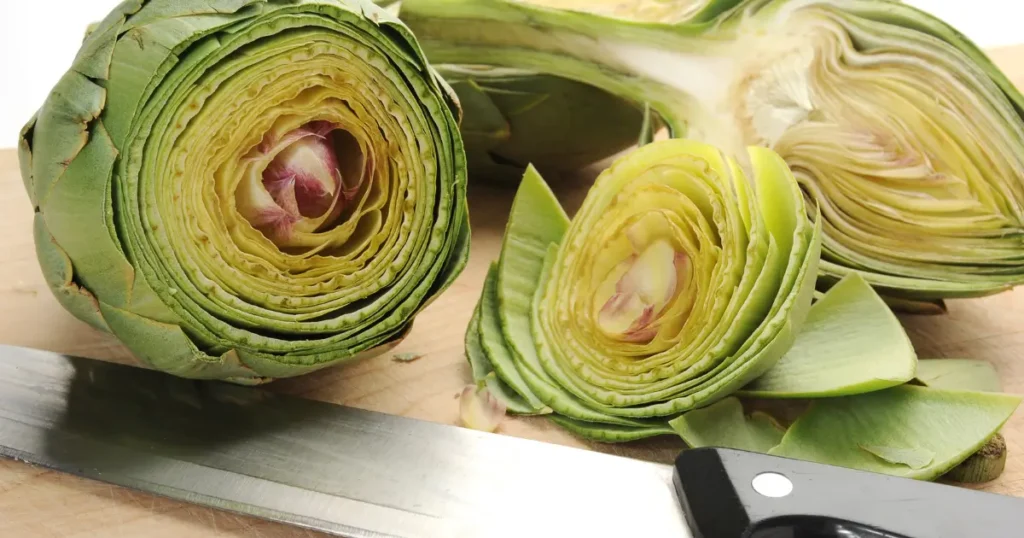
Despite the nutritional benefits, there are several important considerations and potential risks to be aware of when addressing “Can dogs eat artichokes?” Understanding these risks will help you determine if artichokes are appropriate for your specific pet.
Choking Hazards
When examining “Can dogs eat artichokes?”, it’s important to consider that artichokes have several components that could pose choking hazards to dogs:
- Tough outer leaves: These fibrous parts are difficult to chew properly
- Spiny tips: The pointed ends of artichoke leaves could cause injury
- Choke: The fuzzy center portion can be a significant choking risk
- Stem: The dense, fibrous stem may be difficult for dogs to break down
To minimize these risks, always remove the choke (the hairy center portion) and serve only small, manageable pieces to your dog.
Digestive Issues
While artichokes for dogs aren’t toxic, they can cause digestive upset in some canines, especially when introduced suddenly or in large amounts. Potential digestive issues include:
- Gas and bloating: The high fiber content can cause excessive gas
- Diarrhea: Some dogs may experience loose stools after eating artichokes
- Stomach discomfort: New foods can sometimes cause temporary digestive distress
To reduce the likelihood of these issues, introduce artichokes gradually and in small amounts, monitoring your dog’s reaction.
For dogs with sensitive digestion, jicama might be a more easily tolerated crunchy vegetable option, as its fiber is less complex than artichoke fiber.
Similar to cruciferous vegetables like broccoli and cauliflower, artichokes can cause gas in some dogs due to their fiber content, so introducing them gradually is important to monitor your dog’s individual tolerance.
When to Avoid Artichokes
Artichokes can be bad for dogs in certain situations. You should avoid feeding artichokes to your dog if:
- They have experienced pancreatitis or other digestive issues in the past.
- They’re on certain medications that might interact with compounds in artichokes
- They have kidney disease (due to the potassium content)
- They’re prone to calcium oxalate stones (artichokes contain oxalates)
- They have a known sensitivity to foods in the thistle family
Additionally, certain preparations of artichokes should always be avoided:
- Marinated artichokes (often contain garlic, onions, or excessive salt)
- Artichoke dips (typically contain ingredients harmful to dogs)
- Artichokes cooked with seasonings, oils, butter, or spices
Before adding any new food, including artichokes, to your dog’s diet, always get advice from your veterinarian.
Unlike cucumbers, which are easy to serve raw, artichokes require thorough cooking to be digestible for dogs.
Can Dogs Eat Artichoke Hearts?
When considering can dogs eat artichoke hearts, the answer is yes, with some important qualifications. Artichoke hearts are generally the safest part of the artichoke for dogs to consume, as they’re softer and more digestible than the tough outer leaves.
Fresh vs. Canned or Marinated Hearts
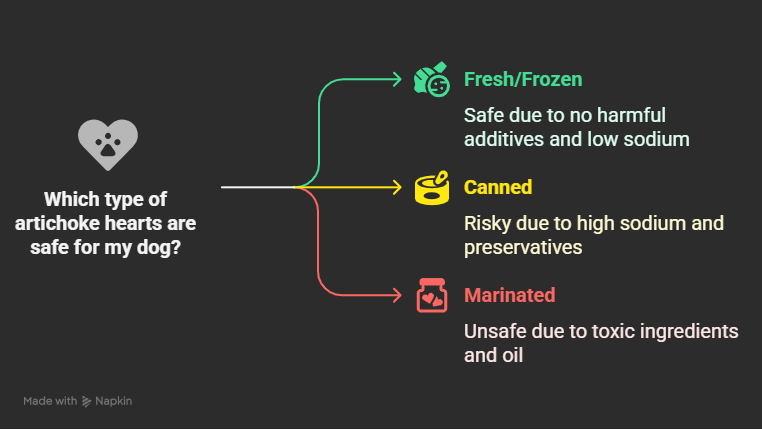
Not all artichoke heart preparations are created equal when it comes to your dog’s health:
Fresh or Plain Frozen Artichoke Hearts
- Generally safe when properly cooked
- Contain no added ingredients that might harm dogs
- Lower in sodium than preserved varieties
- Maintain most of their natural nutritional benefits
Canned Artichoke Hearts
- Often contain salt, which is unhealthy for dogs.
- Should be thoroughly rinsed before serving to reduce sodium content
- May contain preservatives not ideal for canine consumption
- Should only be used if packed in water (not oil or brine)
Marinated Artichoke Hearts
- Usually contain ingredients toxic to dogs (garlic, onions)
- Often preserved in oil, which can cause digestive upset or pancreatitis
- Typically include spices, vinegar, and other additives not suitable for dogs
- Should never be fed to dogs.
If you choose to give your dog artichoke hearts, opt for fresh ones that you’ve prepared yourself or plain frozen varieties that contain no additives.
Unlike sweet potato skins, which can be baked until soft, artichokes require more extensive preparation to be safe for canine consumption.
Serving Suggestions for Artichoke Hearts
If you decide to feed your dog artichoke hearts, here are some safe serving suggestions:
- Steam or boil plain artichoke hearts until very soft
- Cool completely before serving
- Cut into bite-sized pieces according to the size of your dog.
- Mix a small amount with their regular food rather than serving alone
- Start with just a piece or two to monitor for any adverse reactions
Remember that moderation is key, even with the safer heart portion of the artichoke.
How to Safely Prepare Artichokes for Dogs
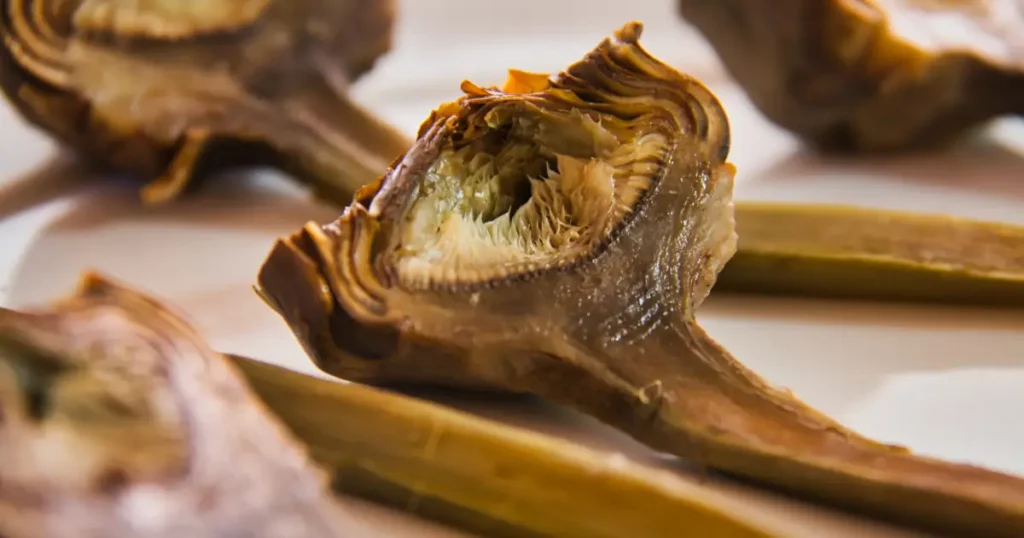
Proper preparation is essential when introducing artichokes to your dog’s diet. When considering “Can dogs eat artichokes?“, Dogs can safely eat artichokes if these preparation instructions are followed.
Step-by-Step Preparation Guide
For pet owners asking, “Can dogs eat artichokes?“, here’s how to prepare them properly:
- Choose firm, fresh artichokes with tightly closed leaves.
- Rinse thoroughly under cool water to remove any dirt or residue
- Trim the stem to about one inch in length
- Cut off the top third of the artichoke to remove sharp tips
- Remove tough outer leaves that are difficult to chew
- Slice the artichoke in half, then remove the fuzzy choke center entirely.
- Boil or steam until very tender (approximately 30-40 minutes)
- Allow to cool completely before serving
- Cut into small pieces according to the size of your dog.
- Serve plain without any oils, salt, butter, or seasonings.
Cooking Methods
Different cooking methods can affect how easily your dog can digest artichokes:
Steaming
- Preserves more nutrients
- Results in a tender texture
- Requires no added ingredients
Boiling
- Creates the softest texture (easiest to digest)
- May reduce some nutritional value
- Ensures thorough cooking
Avoid These Methods
- Roasting (often uses oil and creates tough textures)
- Grilling (typically involves oils or marinades)
- Frying (adds unhealthy fats and calories)
- Raw (difficult to digest and poses choking hazards)
Portion Sizes Based on Dog Weight

Appropriate portion sizes are crucial when feeding artichokes to dogs. Use this table as a general guideline:
| Dog Size (Weight) | Maximum Artichoke Portion | Frequency |
|---|---|---|
| Small (under 20 lbs) | 1 teaspoon of artichoke heart | Once weekly |
| Medium (20-50 lbs) | 1 tablespoon of artichoke heart | Once weekly |
| Large (50-90 lbs) | 2 tablespoons of artichoke heart | Once weekly |
| Giant (over 90 lbs) | 3 tablespoons of artichoke heart | Once weekly |
Remember that these are maximum portions. It’s often best to start with even smaller amounts, especially when first introducing artichokes to your dog.
Signs Your Dog May Have Artichoke Intolerance
While artichokes are generally safe for most dogs, some may have difficulty digesting them or may develop an intolerance. Being aware of the signs of intolerance will help you determine if artichokes are bad for dogs in your specific case.
Symptoms to Watch For
After feeding your dog artichokes, be alert for these potential signs of intolerance or digestive upset:
- Vomiting: Especially within a few hours of consumption
- Diarrhea: May occur within 24 hours after eating artichokes
- Excessive gas: More than your dog’s normal level
- Abdominal discomfort: Signs include whining, pacing, or a hunched posture
- Lethargy: Unusual tiredness or lack of energy
- Reduced appetite: Reluctance to eat subsequent meals
- Itching or skin reactions: In rare cases, food sensitivities can manifest as skin issues
It’s best to stop giving artichokes to your dog and speak with your veterinarian if you observe any of these symptoms after giving them this vegetable.
When to Contact Your Veterinarian
While mild digestive upset might resolve on its own, certain situations warrant immediate veterinary attention:
- Severe or prolonged vomiting (more than 2-3 episodes)
- Diarrhea that is bloody or lasts longer than 24 hours
- Signs of abdominal pain (crying when touched, abdominal rigidity)
- Lethargy combined with other symptoms
- Refusal to consume food or liquids for longer than twenty-four hours
- Difficulty breathing or excessive drooling (potential signs of an allergic reaction)
- Swelling of the face, lips, or tongue (indicates a serious allergic reaction)
Get in touch with your veterinarian right away if your dog exhibits any of these more severe symptoms after eating artichokes.
Key Takeaways
Before incorporating artichokes into your dog’s diet, remember these vital points about “Can dogs eat artichokes?”:
- Moderation is essential – Artichokes should only be an occasional treat, not a regular part of your dog’s diet.
- Proper preparation is crucial – When addressing “Can dogs eat artichokes?”, always thoroughly cook artichokes and remove all potentially dangerous parts before serving.
- The heart is safest – When considering can dogs eat artichoke hearts, remember they’re the safest part, while leaves and the choke should be avoided.
- Watch for individual reactions – Every dog is different; what works for one may not work for another.
- Introduce gradually: To see how your dog’s digestive system reacts, start with very small amounts.
- Artichokes prepared with seasonings, oils, butter, garlic, or onions should never be fed to dogs. Plain is best.
- Balance is key – Ensure artichokes and other treats make up no more than 10% of your dog’s total diet.
Conclusion
So, can dogs eat artichokes? The answer is yes, with important caveats. When properly prepared and served in appropriate portions, artichokes can be a safe, fiber-rich addition to your dog’s occasional treat rotation. The hearts, in particular, offer the most accessible and digestible part of this vegetable for your canine companion.
When pet owners ask, “Can dogs eat artichokes?“, they should understand that the potential benefits must be weighed against the risks of digestive upset, choking hazards, and the extra effort required for proper preparation. For many dogs, there may be simpler, equally nutritious vegetables that pose fewer challenges.
The question “Can dogs eat artichokes?” ultimately depends on the health requirements and preferences of your particular pet. Always prioritize your pet’s individual needs and health status when making dietary decisions. Before adding any new food to your dog’s diet, if in doubt, speak with your veterinarian. With careful preparation and moderation, artichokes can be a unique and potentially beneficial addition to your dog’s treat options.
FAQs
How often can dogs eat artichokes?
When considering “Can dogs eat artichokes?“, frequency is important. Dogs should not eat artichokes daily; instead, they should be treated as an occasional treat. For most dogs, offering small amounts of properly prepared artichoke once a week is sufficient. Always monitor your dog’s reaction when introducing any new food, and adjust the frequency based on their individual tolerance.
Which part of the artichoke is safe for dogs to eat?
For pet owners asking, “Can dogs eat artichokes?“, the heart of the artichoke is the safest part for dogs to eat. The tough outer leaves can be difficult to chew and may pose a choking hazard, while the fuzzy choke in the center should always be completely removed as it presents a significant choking risk. The tender inner leaves may be acceptable if thoroughly cooked and cut into small pieces.
Can artichokes help with my dog’s constipation?
Due to their high fiber content, artichokes for dogs may potentially help with mild constipation. The insoluble fiber adds bulk to stool and can help regulate bowel movements. However, if your dog is experiencing constipation, it’s important to consult with your veterinarian before using any food as a remedy. Chronic or severe constipation may indicate an underlying medical condition that requires proper veterinary care.
Are canned artichokes safe for dogs?
When investigating “Can dogs eat artichokes?” that come in canned form, the answer is more cautious. Canned artichokes are generally not recommended for dogs due to their high sodium content and potential preservatives. If you must use canned artichokes, choose varieties packed in water (not oil or brine), rinse them thoroughly to remove excess salt, and serve in very small quantities. Fresh or frozen artichokes that you prepare yourself are always a safer option for canine consumption.
Can puppies eat artichokes?
While adult dogs can eat artichokes in moderation, puppies have more sensitive digestive systems than adult dogs and are at greater risk for choking. It’s generally best to avoid feeding artichokes to puppies under one year of age. If you do choose to introduce artichokes to older puppies, do so in extremely small amounts, ensuring the pieces are very soft and appropriately sized. Always prioritize a balanced puppy food that meets all their nutritional needs during this critical growth period.

